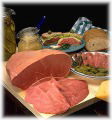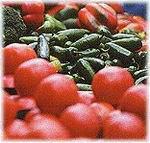 Armenia has a fast growing food processing sector with great export potential, based on domestic ecologically clean agri-products and excellent climatic conditions. Today, the Agriculture sector is the largest employer in the country and accounts for approximately a quarter of GDP.
Armenia has a fast growing food processing sector with great export potential, based on domestic ecologically clean agri-products and excellent climatic conditions. Today, the Agriculture sector is the largest employer in the country and accounts for approximately a quarter of GDP.
Fruits and vegetables grown in Armenia are distinguished by taste and absence of chemical fertilizers. Grain crops, vegetables and fruits including grapes, figs, pomegranates, apricots, peaches, potatoes, sugar beets, tobacco, cotton, specific oils (such as geranium), peppermint, and special teas are cultivated in Armenia. The proof of the quality of Armenian foodstuff is shown by the growth of exports.
In 2001 the export of processed food rose from 9% of total exports in 2000 to 14% in 2001.
Several international loans for reconstruction of agricultural infrastructure, and grant projects for the sector (from Japan, Greece, USA, Holland as well as the World Bank), have been initiated since 1995. Among them are "Rehabilitation of Irrigation Systems in Armenia? (55.15 million US$), "Development of Agricultural Services in the North-West Regions Program? (13.4 million US$), "Assistance to Agricultural Reforms Programme? (5.3 million US$) and "Water Reservoirs Safety Program? (30.3 million US$).
Food Processing
Since 1995 food processing has been one of the leading industrial sectors, constituting 37% of gross industrial production. Armenia?s fruit and vegetable products have great potential for international markets.
Food processing enterprises mainly specialize in fruit and vegetable canning (fruit juices, jams, tomato paste, marinade, child nutrition etc); beverages (wines, beer, champagne, mineral water, etc.); meat and meat products (smoked meat, sausages etc.); milk and other dairy products (different types of cheese, sour-cream, matsun (yogurt), curd, ice-cream, etc.); flour and bread; tobacco and cigarettes. Large growth has been recorded in fishing, sausages, beverages, and nonalcoholic drinks.
Growth Rate in Food Processing Sector of Armenia
Fast growth in the agricultural sector has led to import substitution by domestic production during the last number of years.
Investing in food processing will give foreign investors the opportunity to enter the CIS market, and to enjoy the "high quality - low cost - high profit triangle?.
Major Foreign Investments and Cooperations in Agri-Food production
Beverages
In 1998, the Yerevan Brandy Company (YBC) became part of the International Group Pernod Ricard. YBC brandies are exported to more than 20 foreign countries and are well recognized not only in Russia, but also in the USA, Canada, Japan, France, Germany, Israel, and the Baltic States. The sales are expected to increase and reach 6.5 million bottles in 2002 (6.1 million in 2001). Thanks to their unique quality and special taste, the YBC Armenian brandies have been awarded more than 160 medals in international exhibitions and tastings. They received the Armenian government award for quality in 2000, and ARARAT 3 Stars brandy was awarded "Product of the Year" in Russia 3 years in a row in 1999, 2000 and 2001. Ararat 5 Stars was awarded "Product of the Year".
Another French Company, Castel, established two joint ventures in 1997 to produce mineral water "Bjni? and beer "Kotayk?. Today, Castel owns 71% of the shares of the Abovian Brewery. These two Companies successfully operate in the domestic market as well as export their products to neighboring markets.
Coca-Cola Company was among the first to enter the Armenian market and opened a bottling plant near Yerevan in 1996.
Tobacco
In 1997, "Grand Tobacco? an Armenian-Canadian JV was established. The production capacity is 9 billion cigarettes per year. Today, output is exported to Georgia, Russia, the USA, Ukraine and the countries of the Middle East. In 2000, "Grand Tobacco? was awarded the ISO 9002. Grand Tobacco is also planning a joint venture with a Russian firm to produce cigarette packaging, instead of importing it as at present. An Armenian-Greek tobacco processing joint venture, Masis-Tabak, started operations in January 2000 to supply Grand Tobacco with fermented tobacco. Masis-Tabak is expected to achieve full capacity of 13,000-15,000 tonnes in 2001, processing both imported and locally grown tobacco. Most of the products will be exported, mainly to Russia. Masis-Tabak also plans to set up another fermentation and blending plant in Nagorno-Karabakh.
Another company operating in this sector is SPS Cigaronne Co. Ltd., which produces luxury cigarettes. They quickly occupied a niche in the world market. The outstanding feature of Cigaronne is the 70 mm long hard filter holder, which has been specially developed in Great Britain.
Sweets Production
In 2000, Grand Tobacco and Brogus a Russian company set up Grand Candy, a JV based on the former Armconfection Factory. Today, there are more than two hundred types of confectionery in the Grand Candy assortment. Grand Candy has four main production departments: the hard candy department, the chocolate department, the biscuit department and the ice-cream department. Grand Candy products are very popular both in the domestic market and abroad. A large quantity of production has already been exported to the USA, Canada, Russia, Iran, Georgia and Lebanon. The Company intends to increase its sales in the domestic market, and to gain the market in Arabic countries.
Mineral water, juices and beer
Armenia has about 500 natural springs, the most famous of which are Jermuk, Arzni, Dilijan, Bjni, Hankavan and Sevan. Less than 1/5 of the springs have been studied and recommended for use as drinking water. Eight are licensed for production. Armenian mineral waters have medicinal qualities and the potential to become an important export item. Mineral water production has increased by almost 65%. The companies centered in Jermuk produce about 20 million bottles per year. The largest are Jermuk Group and Jermuk JSC, exporting their production to CIS, the Middle East, and the US. Another exporter is Bjni bottling plant, a joint venture with BGI a member of the Castel Group (France). Coca Cola Company is also an exporter of local water, bottled under the brand name Bonaqua.
Castel Company established a joint venture to produce "Kotayk? beer, that is successfully consumed in the local market and exported. In November 1999, another beer producer, the Yerevan Brewery, won the Gold Star at the Geneva Brewers? Competition, beating breweries from 54 other countries for its "Kilikia? brand name.
The juice processing industry has seen the highest growth rate in Armenia. Several plants have been renovated in recent years installing new processing and packaging lines. The major private firms are: Sardarapat, which produces 4,500 1-liter packs of juice per hour; and Euroterm, which produces fruit concentrates and juices, processing up to 15,000 tonnes of fruit annually.
Milk and Meat Processing
At present, there are almost 38 milk processing enterprises producing 320 thousand tonnes of dairy products and 22 thousand tonnes of cheese annually.
With the financial support of the American organization UMCOR, Akhurian, Kapan and Yerevan milk plants and Aparan, Goris and Tavush cheese plants are continuously increasing their production capacity. Production of Dutch, Swiss and Rochford types of cheese has been re-established. Grant funds received from the Government of Holland are being used to upgrade Tashir and Stepanavan cheese plants.
Ice-cream production in Armenia was successfully developed in the late 1990s. Since then imports of ice cream have been substituted by local production.
Stockbreeding and meat processing have improved since the 1990s. Currently, 5 private major enterprises (in Gavar, Yerevan, Vanadzor, and Gyumri) operate in this area with a total annual capacity of 34 thousand tonnes of meat and sausage production.
Key sectors:
IT, Electronics and Precision Eng., Mining, Energy, Fine chemicals and pharmaceutecal, Jewelry and diamonts, Textiles and Closing, Food and drinks, Tourism
